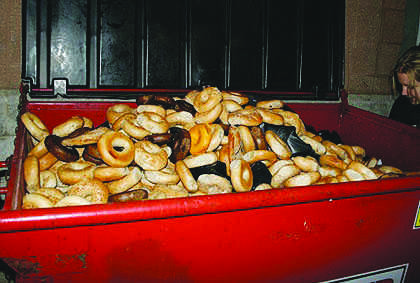
Though increasing tuition costs make students’ budgets tighter each year, most incoming students at NYU probably do not envision themselves spending their evenings on the city’s streets, digging through trash bags for food. However, with the recent rise of freegan culture, some students are doing just that.
Freeganism, a movement centered around finding meals in dumpsters, began in the mid-90s in radical anti-consumerist circles. Recently, freegan practices have become more widely accepted, with some NYU students finding that dumpster diving is not as gross as it sounds.
LS sophomore Katie Fustich has participated in freeganing on several occasions. She said she is most successful when she comes equipped with gloves and plenty of bags.
“It’s definitely as sanitary as you put in the effort to make it,” Fustich said.
Nonetheless, dumpster diving is frowned upon by many. It is often viewed as dangerous, since dumpster divers can never be certain the food they find will be safe to eat. There is also a stigma attached to digging through garbage.
GLS sophomore Lola Harney experimented with freeganism last semester.
“At first I was embarrassed to be scrounging through trash bags, but soon I forgot my fear of germs and dug in,” Harney said.
Harney said she was surprised to find out how much of perfectly good produce and pastries were being thrown away. Because grocery stores and pharmacies cannot sell products after the labeled sell-by date, many items that still have not spoiled must be disposed of anyway.
“I personally found containers full of slightly soft avocados, trash bags full of barely bruised bananas, every type of vegetable you can imagine and calcium vitamins,” Harney said. “Outside of Starbucks, I found individually wrapped pastries that normally sell for four dollars each.”
Fustich also found an abundance of food when she tried freeganing.
“When you get into it, it’s surprising to see the types of things you can find,” Fustich said.
The best time for freeganing is early evening, between trash pickup and when stores take their bags to the curb. Seasoned freegans get to know the general trash schedules of stores in their neighborhoods. A detailed plan and route can make a big difference in the successfulness of freeganing.
Stores known for their fruitful trash bags include Le Pain Quotidien, D’Agostino, Duane Reed and Panera Bread. Grocery stores, pharmacies and bakeries usually throw away the largest amounts of salvageable food.
So large are these amounts that freegans often find far more food than they can consume themselves.
“Witnessing the extremes of mankind wasting things, especially food, is really disappointing and makes you want to do something about it,” Fustich said. “I hope that it spreads and becomes a less taboo concept so that people who are actually in need of food can take advantage of the possibilities of freeganing.”
Harney agreed and said she gained a new perspective from freeganing.
“Freeganing forced me to reconsider my daily routines and reliance on material objects,” Harney said.
A version of this article appeared in the Tuesday, March 11 print edition. Chandler West is dining editor. Email her at [email protected].






















































































































































